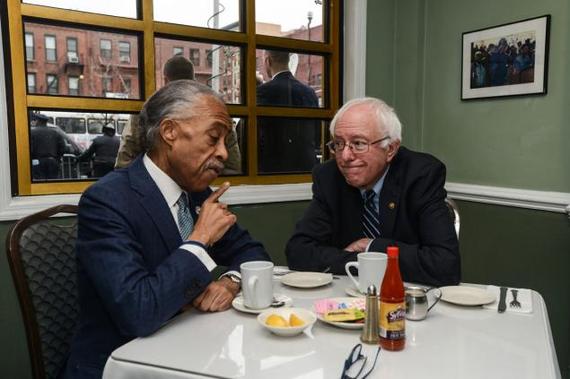Following his meeting with Bernie Sanders, Al Sharpton explained: "My concern is that in January of next year, for the first time in American history, a black family will be moving out of the White House. I don't want black concerns to be moved out with them." I think one could argue that black concerns never truly moved into the White House in the first place; not in any substantial way. Tavis Smiley argued that African Americans lost ground under President Obama. When one looks at the state of African Americans today it's certainly difficult to find any area where African Americans have truly gained ground.
The Black Lives Matter movement developed in response to the many incidents of unarmed African Americans being killed. Those that have been killed since Obama has been president includes Trayvon Martin, Eric Garner, Aiyana Jones, Tamir Rice, and Kenneth Chamberlain to name just a few. Just as disturbing is the violence within black communities, most notably Chicago. The violence in African American communities is in large part a symptom of the overall instability of those communities. Bernie Sanders described Baltimore as a Third World country after a visit there. We also have to remember that the disparity in unemployment has also persisted throughout Obama's presidency.
President Obama has given a few speeches on race in America in the wake of particular events such as the shooting at Emanuel African Methodist Episcopal Church in Charleston, the verdict of the Trayvon Martin trial, and the grand jury decision in Ferguson. But when we look at policy changes or institutional changes in the racial structure of the United States, we haven't seen much from the Obama administration.
Obama has taken some steps to address the racist and unfair policies that have been attached to the War On Drugs, which the Obama administration has admitted is a failure. The Fair Sentencing Act that was signed in 2010 reduced the disparity between sentencing for crack cocaine and powder cocaine, which has been one of the hallmarks of the racism of the War on Drugs. Obama has also pardoned a number of drug offenders. Outside of addressing these issues, however, the Obama administration hasn't done a whole lot to address issues such as the pervasive poverty and violence in African American communities.
Al Sharpton can partly be blamed for this in the sense that in 2011 he declared that he would never criticize President Obama on anything. That's a mentality we simply cannot afford to have. We cannot elect people into office and be so satisfied to have them there that we are afraid to constructively criticize those office holders in any way. That approach results in communities being neglected and ignored, as has happened to African Americans.
Moving forward in 2016 we have to keep in mind that the issues impacting African Americans go beyond the White House. For example, the ongoing crisis in Flint is not a Federal government issue, but a local governmental issue. For this reason, our goal should not merely be having our concerns represented on a national level, but on a local level as well. This is especially important considering that African American turnout is considerably lower for local elections.
We should also learn from the example of the civil rights movement of the 1960s. As a people we so often focus on the struggle that was waged to win equal voting rights that we seem to forget that African Americans did not win those voting rights through voting. Those rights were won through organizing a mass movement with the intent of creating policy change. For this reason it's not enough for us to vote in the candidate that we feel will best represent us in 2016, but as a people we also have to organize so that our voices are truly heard regardless of who gets elected this year.

